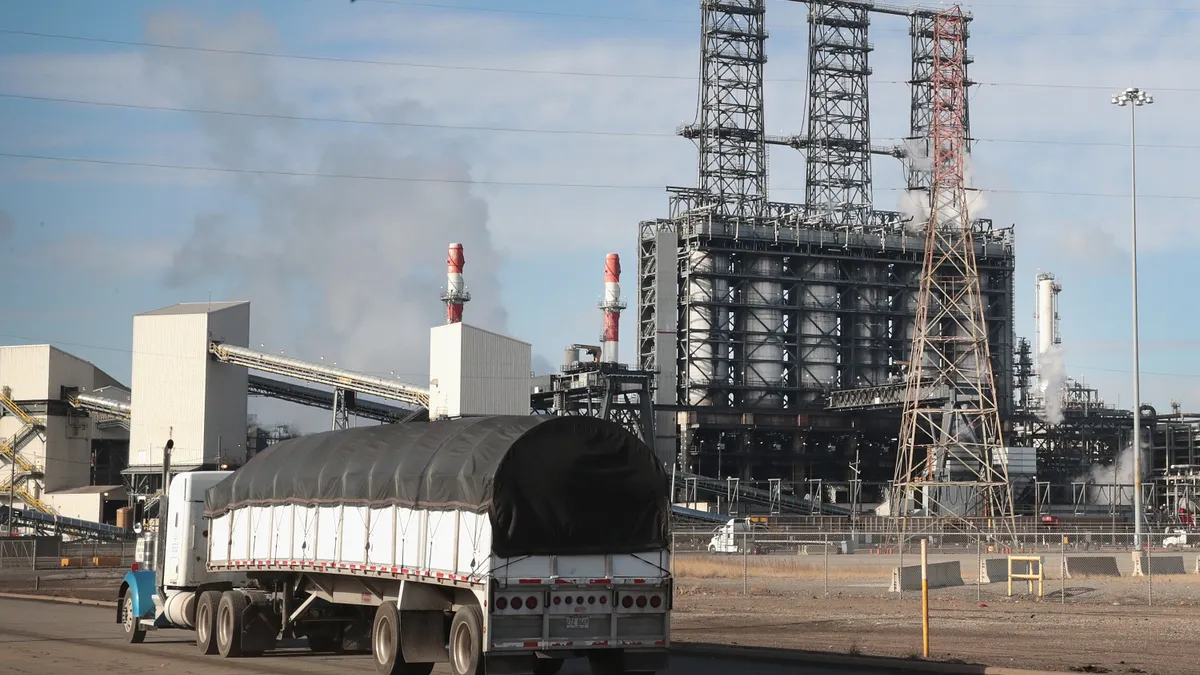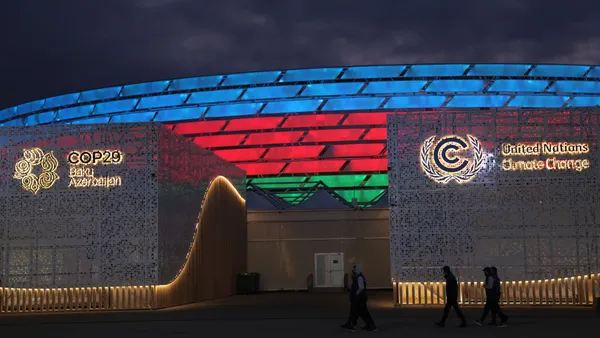Dive Brief:
- Just 16% of the world’s largest companies are on track to reach net-zero by 2050, a slight dip from the 18% that were on track in 2023, according to a recent analysis by Accenture, which evaluated the 2000 largest global companies that report emissions data.
- While the analysis, released Monday, also found that 53% of G2000 companies — the largest companies by sales, profits, assets and market value — have reduced their scope 1 and scope 2 emissions since 2016, experts say companies are not moving fast enough to decarbonize their operations.
- “The fact that so few of the G2000 companies are on track to reach net-zero emissions is alarming,” Andrea Ranger, director of shareholder advocacy at Trillium Asset Management, said in emailed comments to ESG Dive Tuesday.
Dive Insight:
The fourth edition of Accenture’s “Destination Net Zero” report found that 45% of G2000 companies are off-track for net-zero and still have increasing emissions. However, the report also found signs that decarbonization is gaining momentum, with 52% of surveyed companies reportedly reducing both their carbon emissions and emissions intensity since 2016.
Stephanie Jamison, Accenture’s global resources industry practices and sustainability services lead, said in a Nov. 11 press release that it is a "significant milestone” that a majority of companies are cutting emissions while growing in operational size and revenues. However, she said to reach 2050 net-zero goals, “all of us need to move faster, together, to reinvent sustainable value chains using deep collaboration and transformative technologies.”
Or, as Ranger put it: “The existing and predicted impacts of climate change are so dire, companies must saddle up and find emissions cuts before we face an economy-wide financial crisis.”
European companies are most prepared, comparatively, for net-zero, with over 1-in-5 (21%) of companies on the continent on-track to reach net-zero, and just 33% of European G2000 companies reporting rising emissions. North American companies are in-line with the rest of the world, with only 17% of companies prepared for net-zero by 2050.
The results also track with recent data from Morningstar Sustainalytics, according to Anya Solovieva, the global commercial lead of climate solutions for Morningstar’s ESG research arm. Morningstar’s analysis of almost 10,000 global companies found that only 18% of companies aligned with limiting global temperature rise below 2 degrees Celsius, Solovieva said in an emailed analysis of the Accenture study Tuesday. She added that, based on Morningstar’s Low Carbon Transition Ratings, the firm also found that “European companies are more prepared than companies in other regions to manage transition risk.”
Accenture’s report also revealed some positive signs for companies’ decarbonization efforts. While the number of companies with net-zero targets that include scopes 1, 2 and 3 remained stagnant from 2023-24 at 37%, the share of companies with emissions reductions targets that don’t include net-zero or no emissions reductions targets evident decreased. Collectively, companies without such decarbonization targets represent 34% of G2000, down from 45% in 2023.
Additionally, the study saw a jump in companies with net-zero emissions targets that include scope 1 and scope 2 emissions, or those within operational control. Twenty-eight percent of companies analyzed had net-zero targets for their operations, up from 18% in 2023, and overall, 65% of companies had net-zero emissions targets in place.
The report also found that companies are increasingly pushing more “decarbonization levers,” or taking actions that correlate with carbon emissions reduction. Five levers — energy efficiency, waste reduction, renewables adoption, circular principles and building decarbonization — are being utilized by more than 80% of G2000 companies, and Accenture said the methods are “prevalent across all regions and industries.”
Twelve of the 21 levers Accenture examined are being utilized by over half of the G2000 companies, and 30% of companies are using more than 15 types of decarbonization actions to lower their carbon footprint, according to the report.
Steven Clarke, the program director for climate and energy at environmental nonprofit Ceres, said there is an “urgent” need for companies to set targets aligned with leading climate science, given projections that 2024 will be the hottest year on record and the world may have already passed a 1.5 degrees Celsius global temperature increase.
“While the recent trend towards more companies setting net zero targets is encouraging, we need far more companies across all sectors of the economy not only setting 1.5 [degrees] C aligned science-based net zero targets but also developing comprehensive climate transition action plans that demonstrate how they will achieve these goals,” Clarke said in emailed comments.
To ramp up decarbonization efforts, Accenture recommends that in the next three months, companies should set targets and develop transition plans with "comprehensive emissions targets” that include scopes 1, 2 and 3, as well as “immediate actions, clear milestones and external validation.” Over the next year, the report recommends companies should then build a collection of “relevant” decarbonization actions to their businesses.
In the years after that, Accenture said companies should begin to “refine and incorporate” the use of artificial intelligence support for decarbonization. The report found that just 14% of G2000 companies are currently using AI to help with their decarbonization efforts.













